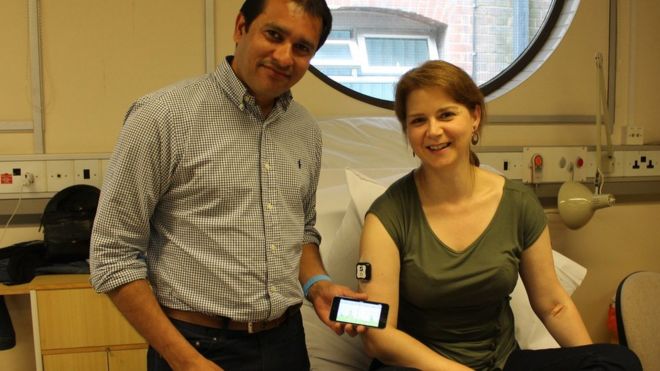 A blood sugar monitor that can stay in the body for up to five months is being tested on NHS patients.
A blood sugar monitor that can stay in the body for up to five months is being tested on NHS patients.
It is hoped the device, which continuously monitors the blood and beams the information to a smartphone, will help control type 1 diabetes.
Patients in London, Cambridge and Swansea are taking part in the trial to assess the safety and accuracy of the monitor.
Current blood-sugar sensors need to be replaced every week.
'Tightrope'
People with type 1 diabetes have to prick their finger regularly to test sugar levels, calculate the amount of sugar in their meals, and use this information to inject themselves with the right amount of insulin.
If levels are too high, there may be damage to the body's organs, but if levels fall too low, it can be fatal.
Dr Pratik Choudhary, a consultant at King's College Hospital and a lecturer at King's College London, told the BBC News website: "Living with type 1 diabetes is a bit like being a blind tightrope-walker.
"You're on this tightrope between high and low blood glucose levels and you're only allowed to open your blindfold four or five times a day.
"Continuous glucose monitoring allows you to open your eyes and see where you're going."
The monitor, built by US company Senseonics, is implanted under the skin in the upper arm.
A fluorescent light shines on to blood vessels and the amount of light reflected back is used to calculate the blood sugar levels, which are sent to a smartphone.
Gwenllian Davies, a 40-year-old classical musician, was diagnosed with type 1 diabetes when she was 17 and is taking part in the trial.
She said: "It basically controls me. When you're first diagnosed, you get the rosy message that you can control it, but actually it's really hard."
When her blood sugar levels dropped to dangerous levels she used to "start to feel a bit shaky, get blurred vision, tingling in the lips, sweating and feeling sick".
She took part in the trial because, she said: "I've lost my hypo awareness, I have to test really often as I just don't know when I'm going low - that's the main problem."
She said using a continuous glucose monitor had been "very reassuring".
New NHS rules from the National Institute of Health and Care Excellence, say continuous monitors should be offered to people with "complete loss of awareness of hypoglycaemia".
Dr Choudhary added: "Knowing what your blood sugar is all the time means you can get better control.
"All the sensors on the market at the moment last a week and you have to take it out and change it. This sensor last three to five months."
Aaron Kowalski, from the type 1 diabetes charity JDRF, uses a continuous glucose monitor that needs replacing every week.
He commented: "One of the things that's important is the proper balance between glucose control - the crux of diabetes - and the cost of wearing a continuous glucose monitor.
"There's an economic cost, but also to your life. Body image is a real issue particularly in adolescent teenagers and young adults, as they don't want to highlight the fact they have a chronic illness."
James Gallagher - BBC News